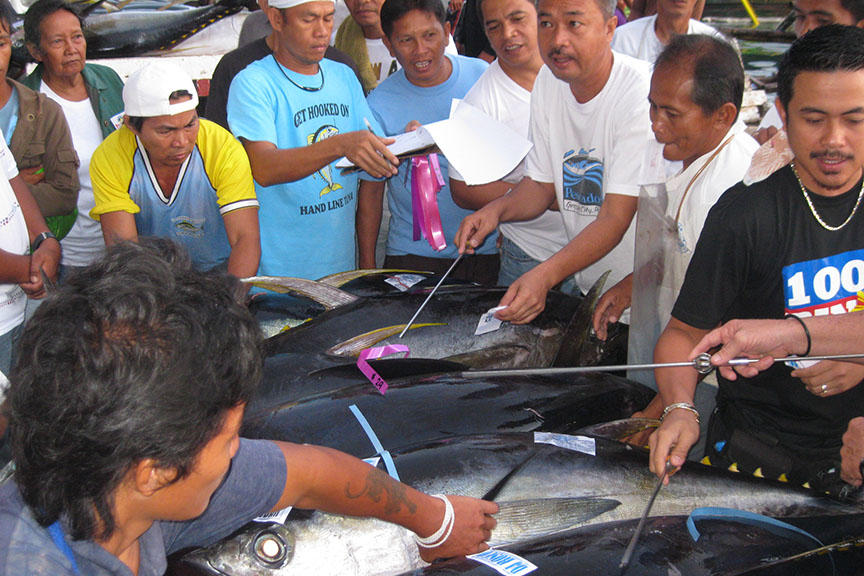GENERAL SANTOS CITY (MindaNews / 15 March) – The series of increases in fuel prices has started to take its toll on the tuna fishing industry here, with some operators reportedly considering suspending operations to avoid further losses.
 Traders haggle for the prices of fresh tuna stocks unloaded at the fish port complex in General Santos City. MindaNews file photo by BONG S. SARMIENTO
Traders haggle for the prices of fresh tuna stocks unloaded at the fish port complex in General Santos City. MindaNews file photo by BONG S. SARMIENTO
Dominic Salazar, president of the Socsksargen Federation of Fishing and Allied Industries Inc. (SFFAII), said Tuesday that tuna fishing companies and other operators have been recording significant spikes in their operating costs due to the situation.
Industry players had estimated that fuel costs, specifically diesel, take up about 60 percent of the total expenses of a regular fishing operation, depending on the distance of the fishing grounds.
The price of diesel here increased to as high as P79.35 per liter on Tuesday as the latest round of adjustments formally took effect amid the rising prices in the global market
“The fishing industry is already feeling the pain brought about by the fuel price increases. Some players I talked with are even considering to temporarily stop their operations if this will continue,” Salazar said in an interview with Brigada News FM.
He said fishing operators might have no other option later on as it is not also viable to continue a losing operation.
Salazar acknowledged that such situation might lead to much bigger negative effects, among them the increase of fish prices and related goods, and job losses for industry workers.
He said SFFAII has been engaging with the city government and other national agencies for possible remedies.
The local government has supported the group’s call to the national government to suspend the value-added tax and excise tax on fuel as immediate relief, he said.
“We might be able to sustain our operations if these taxes are removed,” said Salazar, who is also the president of tuna fishing group South Cotabato Purse-Seiners Association.
During the 20th National Tuna Congress in 2018, which was hosted by SFFAII, industry players passed a resolution urging the Office of the President, through the Department of Finance, to revisit the Tax Reform Acceleration and Inclusion Act or the Train Law and “to totally remove the excise tax on petroleum products that are directly used by the masses, otherwise exempt such products from being imposed with the excise tax, provided the same are used for fishing and fishery activities.”
Salazar also called on the national government, especially the Department of Agriculture, to control the entry of fish imports into the country amid the situation.
This will enable fishing operators and ordinary fishermen to sell their catches at favorable market prices, he said.
Dubbed the country’s “tuna capital,” the city hosts six of the country’s seven tuna canneries and related industries that employ around 120,000 people. The industry exports around $57.89 million worth of fresh, chilled and frozen tuna annually to the global markets.
In 2021, the city fish port complex reported fish unloading of 234,894 metric tons and served 12,979 foreign and domestic fishing vessels, the highest among the eight regional fish ports operated by the Philippine Fisheries Development Authority. (Allen V. Estabillo / MindaNews)
